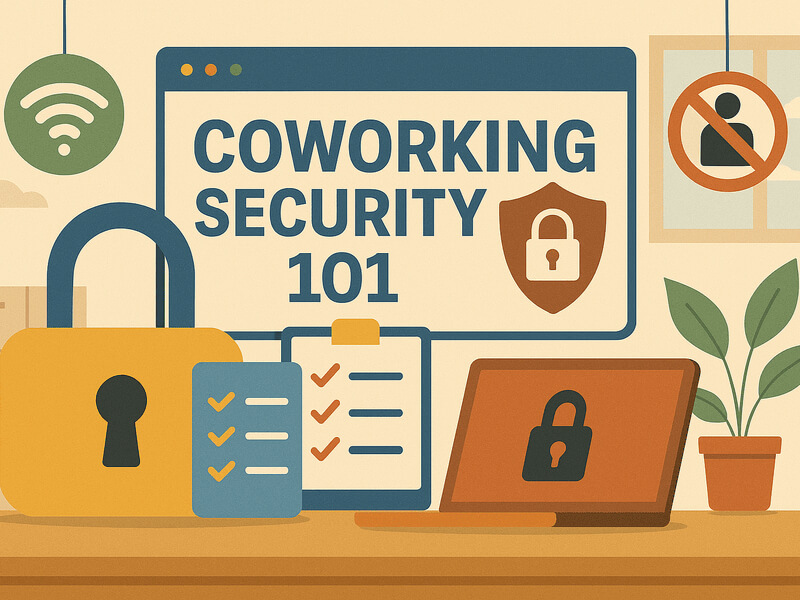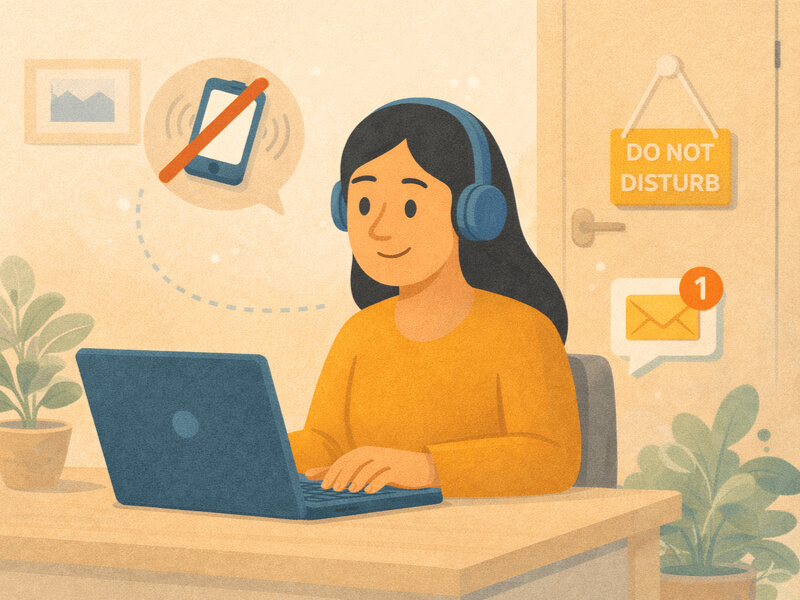
Coworking spaces have become a core part of the modern work landscape in urban areas. Entrepreneurs, freelancers, hybrid and remote teams across the country are turning to shared office spaces to boost flexibility while slashing costs. While there are benefits to these setups, there are also some challenges and risks that come along with them.
Traditional offices with dedicated IT staff and controlled, physical networks. Coworking hubs typically rely on shared infrastructure. This fragmentation makes them appealing targets for cybercriminals, targeting open or minimally secured Wi-Fi. To keep personal and business data safe, workers in these shared spaces need to quickly adopt stronger habits around VPNs and proactive security.
Major Cybersecurity Risks in Coworking Spaces
Shared offices create unique risks because of their size. Dozens of individuals and hundreds of devices operate on the same network and the same physical spaces. One of the most common threats is a rogue hotspot. This looks like your normal network and tricks your computer into logging in.
Physical threats are just as serious, even if they don’t get as much attention in the news. Devices left open, unlocked, or in plain-view open-plan areas are obvious targets for theft. Meeting rooms, shared screens, and even printers can expose sensitive data if not locked down properly.
Why Data Protection Matters for Teams and HR
For individuals and organizations, securing data in coworking spaces isn’t just about convenience. A single breach costs about $180 per stolen record, so even a minor incident in a shared office can turn into a six-figure problem. Cyber insurance helps cover what firewalls and VPNs can't. It’s putting your brand and your reputation on the line when it comes to trust and compliance with your customers’ or clients’ data.
Sensitive business information — including contracts, intellectual property, and financial records — must be protected with strong access controls and, where possible, absolute immutability to prevent unauthorized changes or tampering. They can be exposed if networks and devices aren't secured. For HR teams, the stakes are even higher. Employee records and personal identifiers must be kept safe to comply with GDPR and other privacy regulations. In shared work environments, additional safeguards are often needed to verify and re-verify employee’s identity before allowing access to sensitive systems and HR data.
A single breach can lead to regulatory penalties, lost clients, and lasting damage to a company’s image. With that in mind, someone is a victim of cybercrime about every 39 seconds. Many breaches start with automated scripts that probe logins and scrape data; this plain-language explainer on automated scripts covers what they are and why they matter. Remote and hybrid teams working in coworking environments need clear policies and safeguards. But they have to match the ones in traditional offices. By prioritizing security, HR managers and team leaders show clients, partners, and employees that data protection is taken seriously.
Best Practices for Device and Account Security
Strong security starts with personal devices and accounts. Take a look at these quick tips and best practices.
- Update software regularly: Apply patches for operating systems, browsers, and apps.
- Enable full-disk encryption: Protects files if a laptop or phone is stolen.
- Use password managers: Generate and store unique, complex logins without memorizing them.
- Turn on two-factor authentication (2FA) or passkeys: Stops attackers from logging in with only a password.
- Secure backups: Store data in encrypted cloud platforms or external drives.
Safe Network Habits in Shared Offices
Networks in coworking spaces are convenient. They’re also convenient targets. Before connecting, always verify the official SSID with staff to avoid logging into an evil twin. Always disable auto-join, auto-login, or auto-reconnect for unsafe networks. Use secure DNS or DNS-over-HTTPS to add another protective layer, reducing the chance of redirected traffic.
Workers should also avoid enabling file sharing or printer discovery on public Wi-Fi. These features make it easy for others on the same network to see folders or connected devices. Be mindful of IoT equipment like projectors, speaking or PA equipment, and even security cameras in shared spaces. They can all create vulnerabilities.
Good network hygiene and strong device security help protect data. Shared, high-traffic environments carry greater risk than private offices.
The Role of VPNs in Securing Coworking Connections
Coworking spaces thrive on shared internet access. However, that convenience comes with significant risks. Dozens of people may connect to the same Wi-Fi network at any time without proper safeguards. This makes it easy for attackers to intercept traffic.
A virtual private network solves this problem by encrypting all data that leaves a device. A VPN encrypts data in transit, making emails, files, and logins unreadable to anyone watching the network.
For remote and hybrid teams, VPNs are also vital for compliance. Many companies require employees to use encrypted channels for HR communications. For others, it’s needed to access customer databases. A VPN provides a secure tunnel even in environments where IT staff can’t control the network.
Some professionals still ask, “Is using a VPN legal?” In the US and most other countries, using a VPN to secure your data is perfectly legal. VPNs are fully legal and widely used by businesses and individuals worldwide every day.
Restrictions only exist in a handful of countries abroad. In US coworking spaces, a VPN is a simple, highly effective way to secure your work while staying flexible.
Creating a Security Culture in Shared Spaces
Technology tools alone aren't enough. Teams working in coworking offices also need a culture that prioritizes security. HR managers and team leaders should establish clear policies for network use. This includes handling data, connecting to networks, and reporting suspicious activity.
Training sessions can help employees build basic skills. How to recognize phishing attempts, unsafe downloads, or rogue Wi-Fi hotspots. Promote locking devices when unattended and verifying network details to build stronger resilience.
Managers should create an environment where workers feel comfortable reporting incidents. The faster a response, the less damage a breach can cause. A proactive culture ensures that shared spaces remain productive and secure.
Find Your Balance of Flexibility and Security
Coworking offers substantial freedom. You get reduced operational costs and increased collaboration, but also cyber risks from shared Wi‑Fi and transient users. Make sure to secure devices, enable updates and MFA. Follow safe network practices like strong passwords and disabling auto‑join. Using a VPN then protects data outside traditional office networks. Security‑conscious habits including locking screens, verifying links, and limiting permissions, let you focus on work without sacrificing basic data peace of mind.
























